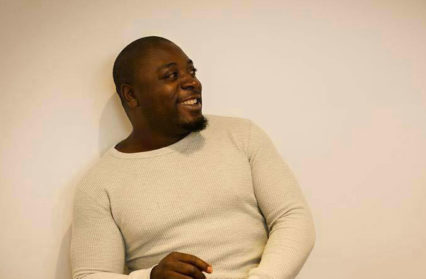To celebrate Black History Month Wales, Durre S. Mughal has compiled a non-exhaustive list of black writers with strong connection to Wales, who should be celebrated and known about for their work and achievements.
Black Writers With Strong Connections to Wales:
Leonora Brito
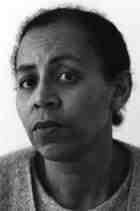 Leonora Brito was born in Cardiff. She studied law and history at Cardiff University. Her story, ‘Dat’s Love’, won her the 1991 Rhys Davies Short Story Competition. She also wrote for radio and television, providing a unique insight into Afro-Caribbean Welsh society, largely unrepresented in Welsh writing until her work appeared. She published one collection of stories, Dat’s Love, in 1995. She died in 2007.
Leonora Brito was born in Cardiff. She studied law and history at Cardiff University. Her story, ‘Dat’s Love’, won her the 1991 Rhys Davies Short Story Competition. She also wrote for radio and television, providing a unique insight into Afro-Caribbean Welsh society, largely unrepresented in Welsh writing until her work appeared. She published one collection of stories, Dat’s Love, in 1995. She died in 2007.
Writing at the time when Cardiff Docks was called Tiger Bay, and was thriving, as it does today, with multiple races and nationalities, the stories in Dat’s Love are told from a dry and humourous perspective, full of wit and acute observation. While they are shaped by Leonora Brito’s African roots, they are never limited to it. The characters are true-to-life, conversational and memorable. Due to her short-lived writing career, sadly little is known about Leonora life, resulting in obscurity from conversations about Welsh writers. Yet with its explorations of race, gender, class and society, her collection is a must read.
See Dat’s Love published by Seren Books.
Professor Charlotte Williams OBE
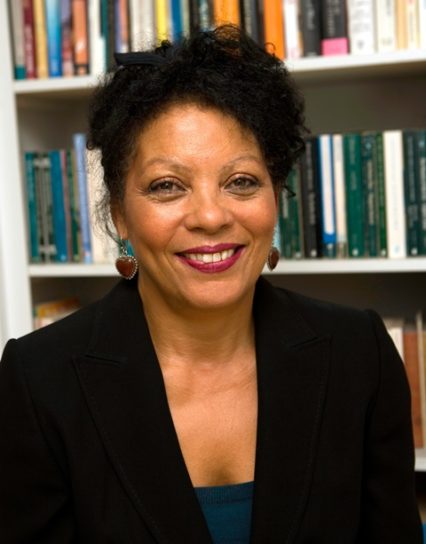 “It would have been so much easier if I had been able to say, “I come from Africa,” then maybe added under my breath, “the long way round.” Instead, the Africa thing hung about me like a Welsh Not, a heavy encumbrance on my soul; a Not-identity; an awkward reminder of what I was or what I wasn’t.”
“It would have been so much easier if I had been able to say, “I come from Africa,” then maybe added under my breath, “the long way round.” Instead, the Africa thing hung about me like a Welsh Not, a heavy encumbrance on my soul; a Not-identity; an awkward reminder of what I was or what I wasn’t.”
Professor Charlotte Williams was born in Wales to a Guyanese father and a Welsh mother. She grew up in a small coastal town, before travelling to Africa, the Caribbean, and back to Wales. In 2007, she was awarded an OBE in the New Year’s Honours List for services to ethnic minorities and equal opportunities in Wales. She has written and conducted a lot of research on the issues of cultural diversity, place, locality, and nationhood, especially in relation to multiculturalism in Wales and in education. Her memoir, Sugar and Slate (2002), is an exploration of mixed-raced identity, and what it means to be Black and Welsh. Reading as a personal and travel memoir in one, it depicts the journey to self-discovery and belonging.
Her most recent book, A Tolerant Nation? (2015) is an exploration of ethnic diversity in Wales. A compilation of 10 essays by different authors, it reflects on diversity in Wales historically until today and the representation, equality and the contribution of ethnic minorities to Wales’ economic, social and cultural life.
Charlotte Williams is currently the Professor of Social Work and Deputy Dean at RMIT University in Melbourne, Australia.
See Sugar and Slate, A Tolerant Nation? (2015), and ‘Imagining Wales Without England in Charlotte Williams’ Sugar and Slate’.
Patience Agbabi
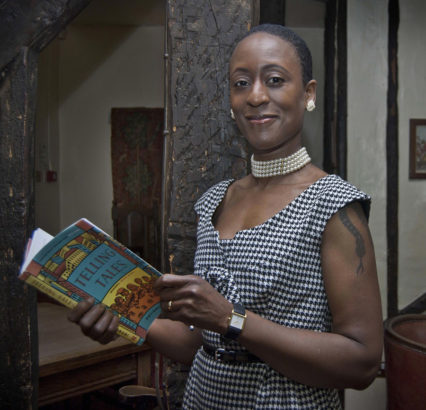 Patience Agbabi was born in London to Nigerian parents, and fostered by a white English family, who moved to North Wales when she was 13. She is one of Britain’s prominent spoken word poets, performers and workshop facilitators. Her book, Telling Tales, was shortlisted for the Wales Book of the Year in 2015. It was written during her time as Canterbury Poet Laureate, published by Canongate in 2014 and shortlisted for The Poetry Society’s Ted Hughes Award for New Work in Poetry the same year.
Patience Agbabi was born in London to Nigerian parents, and fostered by a white English family, who moved to North Wales when she was 13. She is one of Britain’s prominent spoken word poets, performers and workshop facilitators. Her book, Telling Tales, was shortlisted for the Wales Book of the Year in 2015. It was written during her time as Canterbury Poet Laureate, published by Canongate in 2014 and shortlisted for The Poetry Society’s Ted Hughes Award for New Work in Poetry the same year.
From 2002 to 2005, Patience Agbabi lectured in Creative Writing at Greenwich, Cardiff and Kent Universities. Her work moves fluidly between languages, cultures, dialects and tales. Reflecting on her time in Colwyn Bay, Agbabi says that,
“It was a serious culture shock at the time but in retrospect, I can see that it had a beneficial effect on my writing. […] Colwyn Bay was the perfect setting not only for soulies but every youth cult of that era. A town of 25,000 people, it was big enough for culture to emerge, small enough for everyone to know who was who. It was rich in tribes. When I began to write seriously as a young adult, I learnt by copying a dead poet. The Colwyn Bay tribes provided the copy.”
See Telling Tales and British Council Transcultural Writing.
Eric Ngalle Charles
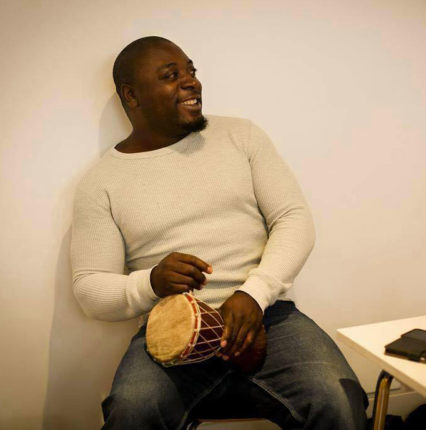 Eric Ngalle Charles arrived in Cardiff in 1999 after fleeing persecution in Cameroon. Having being granted leave to remain, Eric has used his writing through the years to deal with and talk about his experiences. He is the founder of Black Entertainment Wales, an organization which seeks to provide a platform for artists from BME /diaspora backgrounds to showcase their work. Since 2001, he has also worked with various organizations, including Hafan Books, to collate, edited and publish poetry anthologies featuring work from migrants and refugees in Wales.
Eric Ngalle Charles arrived in Cardiff in 1999 after fleeing persecution in Cameroon. Having being granted leave to remain, Eric has used his writing through the years to deal with and talk about his experiences. He is the founder of Black Entertainment Wales, an organization which seeks to provide a platform for artists from BME /diaspora backgrounds to showcase their work. Since 2001, he has also worked with various organizations, including Hafan Books, to collate, edited and publish poetry anthologies featuring work from migrants and refugees in Wales.
His book, Asylum (2016), “is a documentary drama based on the true stories of asylum seekers in Wales. […] It features several refugees he has met through the creative writing classes he runs at the Welsh Refugee Centre in Splott, Cardiff. All have varying stories of abuse, brutality and banishment from their home countries.”
His play, My Mouth Brought Me Here, was staged at the South Bank Centre in London in August. It mixes African proverb and Eric’s poetry to tell the tale of a power-hungry ruler, a few foolish guards and a courageous hunter in a world in which telling the truth has become a game. The production is brought to life with live music and draws on storytelling techniques from around the world.
See Black Entertainment Wales, ‘Former Cameroon refugee pens book on immigration system’.
For a list of anthologies of refugee writing edited by Eric Ngalle Charles, go here.
Bevin Magama
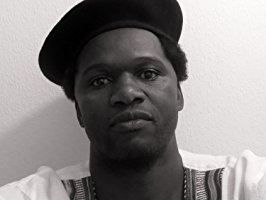 Bevin Magama is a writer, storyteller and a workshop facilitator who has written short stories and plays for theatre and has worked with various organisations in Wales. He is the Team Leader of Magmatic Stories, an organization that seeks to make the world a better place through the art of storytelling, workshops, and other art forms. Magmatic Stories promotes community cohesion and engagement through storytelling across a diverse range of groups. Bevin Magama and his team have successfully run workshops and have delivered their anti-bullying storytelling programme to schools and youth groups in Wales since 2010. The initiative, titled ‘As Good As You Give’, was funded by the Big Lottery and teaches kids how to deal with bullying in a friendly and open environment.
Bevin Magama is a writer, storyteller and a workshop facilitator who has written short stories and plays for theatre and has worked with various organisations in Wales. He is the Team Leader of Magmatic Stories, an organization that seeks to make the world a better place through the art of storytelling, workshops, and other art forms. Magmatic Stories promotes community cohesion and engagement through storytelling across a diverse range of groups. Bevin Magama and his team have successfully run workshops and have delivered their anti-bullying storytelling programme to schools and youth groups in Wales since 2010. The initiative, titled ‘As Good As You Give’, was funded by the Big Lottery and teaches kids how to deal with bullying in a friendly and open environment.
As a writer, Bevin Magama aims to share stories of tolerance, acceptance and hope. His book, Vicious (2013), is an autobiographical memoir, an account of Bevin’s journey from childhood to adulthood.
“In this spellbinding autobiography, Bevin Magama is unflinching in his account of his journey to adulthood. As a child, violence was the norm. As a young man, he joined the Zimbabwean military. He became an intelligence officer in Mugabe’s regime, serving in clandestine operations in guerilla wars in the Congo while raising a family back home. He skilfully played this dangerous game until, one day, he was given orders that forced him to run. Set against the backdrop of Mugabe’s rise to power and reign of terror, Vicious weaves together Magama’s personal recollections with traditional African folklore.”
“What drove me to write this book is a quest for peace after a life caught up in a vicious cycle of violence. I look back and realise I had the freedom to be my own judge and choose either forgiveness or hatred. In my world, I picked up a habit, an addiction to living dangerously and recklessly.”
See Vicious (2013) and visit Bevin Magama’s website for more information.


